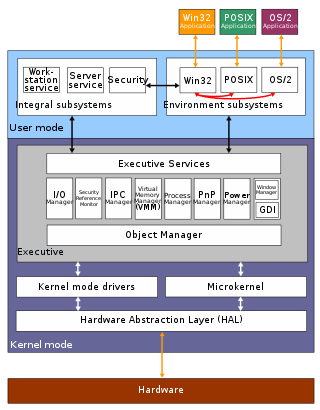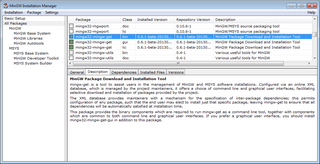
Cygwin is a free and open-source Unix-like environment and command-line interface for Microsoft Windows. The project also provides a software repository containing many open-source packages. Cygwin allows source code for Unix-like operating systems to be compiled and run on Windows. Cygwin provides native integration of Windows-based applications.

In computing, the Executable and Linkable Format, is a common standard file format for executable files, object code, shared libraries, and core dumps. First published in the specification for the application binary interface (ABI) of the Unix operating system version named System V Release 4 (SVR4), and later in the Tool Interface Standard, it was quickly accepted among different vendors of Unix systems. In 1999, it was chosen as the standard binary file format for Unix and Unix-like systems on x86 processors by the 86open project.
The Portable Operating System Interface is a family of standards specified by the IEEE Computer Society for maintaining compatibility between operating systems. POSIX defines both the system and user-level application programming interfaces (APIs), along with command line shells and utility interfaces, for software compatibility (portability) with variants of Unix and other operating systems. POSIX is also a trademark of the IEEE. POSIX is intended to be used by both application and system developers.
Darwin is the core Unix operating system of macOS, iOS, watchOS, tvOS, iPadOS, visionOS, and bridgeOS. It previously existed as an independent open-source operating system, first released by Apple Inc. in 2000. It is composed of code derived from NeXTSTEP, FreeBSD, other BSD operating systems, Mach, and other free software projects' code, as well as code developed by Apple.

UAE is a computer emulator which emulates the hardware of Commodore International's Amiga range of computers. Released under the GNU General Public License, UAE is free software.

The Windows API, informally WinAPI, is the foundational application programming interface (API) that allows a computer program to access the features of the Microsoft Windows operating system in which the program is running.

The mkdir command in the Unix, DOS, DR FlexOS, IBM OS/2, Microsoft Windows, and ReactOS operating systems is used to make a new directory. It is also available in the EFI shell and in the PHP scripting language. In DOS, OS/2, Windows and ReactOS, the command is often abbreviated to md.

wxWidgets is a widget toolkit and tools library for creating graphical user interfaces (GUIs) for cross-platform applications. wxWidgets enables a program's GUI code to compile and run on several computer platforms with minimal or no code changes. A wide choice of compilers and other tools to use with wxWidgets facilitates development of sophisticated applications. wxWidgets supports a comprehensive range of popular operating systems and graphical libraries, both proprietary and free, and is widely deployed in prominent organizations.

DJ's GNU Programming Platform (DJGPP) is a software development suite for Intel 80386-level and above, IBM PC compatibles which supports DOS operating systems. It is guided by DJ Delorie, who began the project in 1989. It is a port of the GNU Compiler Collection (GCC), and mostly GNU utilities such as Bash, find, tar, ls, GAWK, sed, and ld to DOS Protected Mode Interface (DPMI). Supported languages include C, C++, Objective-C/C++, Ada, Fortran, and Pascal.

MinGW, formerly mingw32, is a free and open source software development environment to create Microsoft Windows applications.
In software engineering, a compatibility layer is an interface that allows binaries for a legacy or foreign system to run on a host system. This translates system calls for the foreign system into native system calls for the host system. With some libraries for the foreign system, this will often be sufficient to run foreign binaries on the host system. A hardware compatibility layer consists of tools that allow hardware emulation.

Xpdf is a free and open-source PDF viewer and toolkit based on the Qt framework. Versions prior to 4.00 were written for the X Window System and Motif.

MicroEMACS is a small, portable Emacs-like text editor originally written by Dave Conroy in 1985, and further developed by Daniel M. Lawrence (1958–2010) and was maintained by him. MicroEMACS has been ported to many operating systems, including CP/M, MS-DOS, Microsoft Windows, VMS, Atari ST, AmigaOS, OS-9, NeXTSTEP, and various Unix-like operating systems.

Linux is a family of open-source Unix-like operating systems based on the Linux kernel, an operating system kernel first released on September 17, 1991, by Linus Torvalds. Linux is typically packaged as a Linux distribution (distro), which includes the kernel and supporting system software and libraries, many of which are provided by the GNU Project. Many Linux distributions use the word "Linux" in their name, but the Free Software Foundation uses and recommends the name "GNU/Linux" to emphasize the use and importance of GNU software in many distributions, causing some controversy.
The Free Unix Spectrum Emulator (Fuse) is an emulator of the 1980s ZX Spectrum home computer and its various clones for Unix, Windows and macOS. Fuse is free software, released under the GNU General Public License. There are ports of Fuse to several platforms including GP2X, PlayStation 3, PlayStation Portable, Wii, the Nokia N810, and Android.

AmiKit is a compilation of 425 pre-installed and pre-configured Amiga program running on Windows, macOS, Linux computer, and on Amiga computer with Vampire V2 card.
Mingw-w64 is a free and open-source suite of developments tools that generate Portable Executable (PE) binaries for Microsoft Windows. It was forked in 2005–2010 from MinGW.












